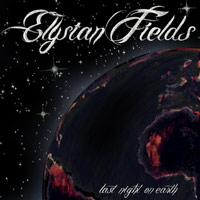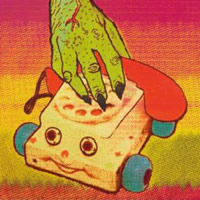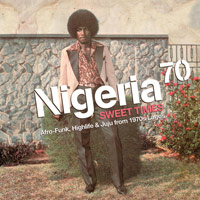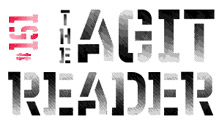
Last Night on Earth
Ojet/Diluvian
Though they came up in New York, Elysian Fields (a.k.a. singer Jennifer Charles and guitarist Oren Bloedow) haven’t put out an album Stateside in 10 years. It’s not that they’ve laid dormant for the last decade—they’ve released three records in Europe—but the last time those of us on this side of the pond heard from them was with Queen of the Meadow, released in 2000 by the now defunct Jetset label.
Nevertheless, it is telling of the impression that record made that I’ve not forgotten the band over the past decade. That record was imbued with noir aesthetics indicative of the duo’s downtown upbringing, while Charles’ voice hearkened more than a little to that of Hope Sandoval. But instead of getting lost in hazy atmospherics that might have shrouded any distinctions, the Fields proved adept at shifts in subtlety and sonic texture. It was a beautiful and special record, no matter how shadowy it may have been.
Last Night on Earth was recorded last winter in a cold-water flat in Crown Heights. While the album shows that not a lot has changed in the last 10 years—the pair still has a penchant for macabre tones and Charles’ vocals remain as smoky and sultry—it isn’t as flawless as one might hope. The record leads off with “Sleepover,” a coming of age store whose nursery-rhymed structure is too heavy-handed. The grim blues of “Red Riding Hood” suffer for a similar fault, but the song rocks enough to make up for it. However, when the band lets songs like “Johnny” and “Old Old Wood” unfold naturally, the nuances of their craft shine. Both are acoustic numbers speckled with Brechtian touches, and as such, are at once delicate and potent. So while Last Night on Earth may disappoint in some respect, the Elysian Fields remain a band not to be overlooked.
Stephen Slaybaugh

Castlemania
In the Red
Over the past few years, San Francisco’s Thee Oh Sees have developed a reputation as one of the foremost bands in modern underground rock, with their blistering live performances and a steady stream of solid psychedelic garage rock records, perhaps highlighted by 2009’s Help. But early last year, the sheer number of songs springing forth from the mind of band leader John Dwyer had gotten a bit overwhelming, and it seemed as if Oh Sees fatigue might be setting in. In a surprising twist of events, after releasing the Warm Slime album last May, the band went relatively quiet, and that fatigue turned into withdrawl.
Castlemania, though, was worth the wait. While Dwyer is on record as saying that Castlemania is Thee Oh Sees’ “summery and poppy” album, the record on the whole might actually have a little less sunshine and pop goodness than Warm Slime. It is, however, equal to—if not better than—that record. Castlemania could be divided roughly into three parts. Of course, there’s a healthy dose of frantic, raucous electric jams in Thee Oh Sees tradition, including the great “Pleasure Blimps,” which serves as a fitting homage to ’60s rock. The core of the album, however, is acoustic songs like “I Need Seed,” “Spider Cider” and “Blood On The Deck,” which come off as the band’s evolution, taking its trademark sound and dialing back the bombast a bit so that the melodies can move to the forefront. The final four songs on the album are quieter, almost contemplative, and are highlighted by the mesmerizing instrumental, “The Horse Was Lost,” and a cover of the Creation’s “If I Stay Too Long.” The latter showcases the band’s wide range of abilities and caps off what is the most well-developed Oh Sees album to date.
Ron Wadlinger

Knives from Heaven
Thirsty Ear
Hip-hop is in many ways just like the summer blockbuster movie series. You get a big hit and you’ve got to tap that well until it’s dry. After all, if Jay-Z can keep cranking out sequels to The Blueprint, then why can’t the abstract technicians in Antipop Consortium do something similar? After reuniting in 2007, they continued on the path of skewed jeep beets of 2002’s Arrhythmia with Fluorescent Black. The album was a far cry from the fractured soundscapes with which they initially made their name on full-length debut Tragic Epilogue, but it made evolutionary sense. So it comes as a bit of a minor surprise that Antipop’s Beans and High Priest decided to again join up with avant garde pianist Mathew Shipp and bassist William Parker for their latest project, Knives from Heaven.
Knives from Heaven is a sequel to 2003’s Antipop vs. Mathew Shipp: The Blue Series. The Blue Series was a project where Shipp would collaborate with like-minded musicians in different genres. It was also the last album Antipop made before they split up. So in many ways this release is like a homecoming for the band, or at the very least, a return to balancing the two different sides of the Antipop camp. For those who miss the days of Tragic Epilogue, this is the record for you.
For casual fans, however, Knives from Heaven may be a hard road to hoe. It clocks in at a very reasonable 44 minutes, but that time is divided between more than 20 tracks. Obviously there are a lot of musical ideas to digest, so even though the tracks are short, the album can be a bit overwhelming. The bulk of the record focuses on the instrumental side of things, with Antipop strongly leading the way. There are times when Shipp and Parker’s contributions seem a bit murky, but there’s almost never a doubt about when Beans and Priest are in the house. Their rhymes are relatively few, but their sonic fingerprints are all over the record. Knives may seem too dense on the first few listens, but there are more than enough ideas to chew on for quite a long time.
Dorian S. Ham

Absolute II
Jagjaguwar
Brooklyn’s Oneida have always been a tough sell to anyone not accustomed to lengthy repetitive Kraut-influenced psychedelic jams. But for their rabid cult following, the band has been incapable of fault. Each release is another piece of the monolith, each an endless foray into the ether and another opportunity to connect. (They reportedly played an 11-hour set at last year’s ATP.) In 2008, when the quintet announced Thank Your Parents, a triptych of albums that would be centered with a triple-album of epic proportions, heads who swear by Oneida felt this would be their Holy Grail. Granted, Rated O, that sprawling middle record, encompassed everything the band has established so far. It was heavy, it was minimal, it was explosive and subversive, but always rambled on without missing a groove. But Pre-Teen Weaponry, the first chapter of Thank Your Parents, was merely a prologue, unable to stand alone, despite the band’s insistence.
Now three years later, Thanks Your Parents has come to a conclusion with Absolute II, and again, though the band contends the album can stand alone, after the face-melting power of Rated O, Absolute II is merely the epilogue. Of all the wonderful albums Oneida have made in their time, this may be the most unbearable. For starters, Absolute II is without a voice, without drums, without rhythm, and nearly without guitars. It isn’t until four minutes into the 11-minute “Horizon” that a plucked string appears, and even beyond that, the guitar, as evidenced in “Gray Area,” is utilized as sculpture, harvesting raga-riffs of feedback and atonal shifts rather than melody or structure. Oneida spend the entire album manning organ drones, twisting knobs and experimenting as the tape rolls. As instrumentals, Absolute II is the complete inverse of ambience. It’s unnerving, paranoid, soulless, metal machine music—were the machines left to their own devices. Sure, among Oneida’s catalog, there’s a need for a true noise record, and who knows, in the context of Thank Your Parents’ mammoth 200 minutes, Absolute II may sound like the perfect ending. (I’m imaging a landscape without human touch, wherein our industrial creations and unwieldy nature have conquered.) But for casual listening or a starting point for such a modern titan, avoid at all costs.
Kevin J. Elliott

Nigeria 70—Sweet Times
Strut
The subtitle of the first volume of Strut’s Nigeria 70 series, “The Definitive Story of Funky Lagos,” is no overstatement. The three-CD compilation, which was released in 2001, remains one of the most well done overviews of the music that emerged in the West African nation during the 1970s. It vividly showed how highlife, the popular music of the first half of the 20th century, mingled with other contemporary African styles (juju, fuji), as well American sounds blowing in from the West, to mutate into something else entirely.
Following on 2008’s Lagos Jump, Sweet Times, another single-disk comp, looks to add yet another appendix worthy of its predecessors. The volume was once again compiled by Duncan Brooker, who selected the tracks in the other two sets, and puts the emphasis on tracks clearly showing their Western roots. This is most obvious on Eji Oyewole’s “Unity in Africa,” which despite its nationalistic pride, is steeped in Motown funk. So too with the instrumental “King of Jungle” by Tunde Mabadu, which offers an even more modern take on Western fare bordering on disco.
The best songs here, though, strike a balance that favors their African heritage. While the guitar riff to the Don Isaac Ezekiel Combination’s “Ire” owes something to American R&B, the conga rhythms and chanted choruses belong to the dark continent. “Ama Mbre Ewa” by Etubom Rex Williams & His Nigerian Artistes is more highlife than anything else, yet still sounds modern with very little outside influence. Sweet Times may not be as indispensable at the first volume of Nigeria 70, but it’s immensely enjoyable in its own right.
Stephen Slaybaugh
ALBUM REVIEWS
Arctic Monkeys, Suck It and See
The Ladybug Transistor, Clutching Stems
City and Colour, Little Hell
Seapony, Go With Me
Death Cab for Cutie, Codes and Keys
My Morning Jacket, Circuital
Friendly Fires, Pala
Ear Pwr, Ear Pwr
Various Artists, Blow Your Head V.2: Dave Nada Presents... Moombahton
Kid Congo and the Pink Monkey Birds, Gorilla Rose
Urge Overkill, Rock & Roll Submarine
White Denim, D
Zachary Cale, Noise of Welcome
Tara Jane O'Neil and Nikaido Kazumi, Tara Jane O'Neil and Nikaido Kazumi
